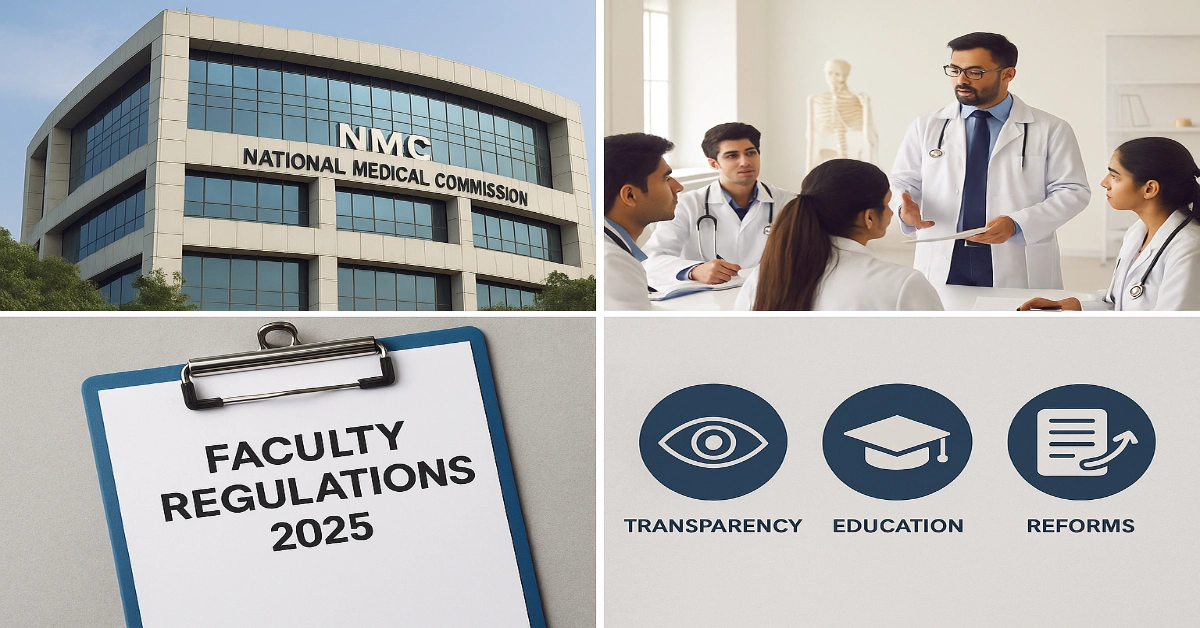NMC Clarifies Faculty Qualification Rules 2025: The National Medical Commission (NMC) issued a comprehensive clarification document, addressing stakeholder queries regarding the Medical Institutions (Qualifications of Faculty) Regulations, 2025, which officially came into effect on June 30, 2025.
In a formal communication, the Post Graduate Medical Education Board (PGMEB) under NMC stated that several medical colleges, teaching institutions, and professionals had sought clarity regarding eligibility, experience criteria, and transitional provisions for faculty appointments.
To ensure uniform interpretation and implementation, the NMC has now released a set of Frequently Asked Questions (FAQs) elaborating on the key aspects of the new rules.
NMC Clarifies Faculty Qualification Rules 2025:
NMC Clarifies Faculty Qualification Rules 2025: Eligibility & Transition
According to the NMC, the new Faculty Qualification Regulations, 2025, are applicable from the date of publication, June 30, 2025.
During this transition phase, the NMC will recognise continuous, full-time teaching experience of at least three years in departments or institutions specifically dedicated to new or emerging medical specialties.
Eligible experience includes:
- Full-time experience in departments of NMC-recognised medical colleges or teaching hospitals with approved infrastructure for the specialty.
- Tenure in nationally recognised institutes like AIIMS, PGIMER Chandigarh, NIMHANS Bengaluru, JIPMER Puducherry, and Sree Chitra Tirunal Institute, Thiruvananthapuram.
- Experience in NBEMS-accredited institutions or other reputed national and international medical institutions approved by NMC after evaluation.
This transition framework ensures that qualified doctors working in government and accredited setups are not disadvantaged during the policy shift.
New Criteria for Senior Consultant, Professor & Associate Professor
Under the Medical Institutions (Qualifications of Faculty) Regulations, 2025, the faculty designation structure has been redefined for better clarity and standardisation.
Senior Consultant
A Senior Consultant is defined as a specialist working in an NBEMS-accredited department of a government institute who meets the prescribed academic qualifications and teaching experience required to function as a postgraduate teacher.
Such professionals must also produce an official experience certificate when applying for a Professor post in any medical college.
Professor
To qualify for appointment as a Professor, an individual must have:
- At least three years of postgraduate teaching experience after becoming eligible as a Senior Consultant and PG teacher in the same specialty.
- Proven contribution to medical education or research in the relevant field.
Associate Professor
A doctor with a minimum of 10 years of post-PG experience in a government hospital (220+ beds) will be eligible to be appointed as Associate Professor, provided they complete:
- Mandatory courses in medical education and biomedical research within two years of appointment.
This framework recognises the academic value of service experience in government institutions while maintaining a structured academic pathway.
Read Also: NMC Medical College Faculty Rule 2025: Know Who Will Teach You MBBS!
Assistant Professor Eligibility Simplified
The NMC has introduced a broader definition of eligibility for the Assistant Professor post:
- Any registered medical practitioner with a recognised postgraduate qualification and two years of cumulative experience in a government hospital (minimum 220 beds) can now be appointed as an Assistant Professor, even without a one-year Senior Residency in a medical college.
Additionally:
- Diploma holders appointed as Senior Residents before June 8, 2017, will qualify for Assistant Professor roles after four years of teaching experience in NMC-recognised institutions.
- Practitioners with a diploma qualification and six years of post-diploma experience in teaching institutions are also eligible.
This move significantly expands faculty recruitment opportunities, particularly for doctors serving in government hospitals and NBEMS-accredited setups.
Special Provisions for Emergency Medicine
In a notable update, the NMC clarified cross-specialty eligibility for Emergency Medicine faculty positions.
Faculty members from the following specialties:
- General Surgery
- Anaesthesia
- Respiratory Medicine
- Orthopaedics
- General Medicine
may now be directly appointed as Assistant Professor, Associate Professor, or Professor in Emergency Medicine, depending on their cumulative teaching experience in their respective fields.
Importantly, their previous teaching experience will also be counted towards promotions and eligibility for administrative positions.
This change acknowledges the multidisciplinary nature of emergency and critical care, ensuring a larger qualified talent pool to meet India’s growing healthcare demands.
Super Specialty Faculty Equivalence
The NMC’s clarifications also address faculty equivalence in super specialty departments.
- Faculty members holding a super specialty qualification and serving in a recognised medical institution under a broad specialty department will be eligible for equivalent positions in the corresponding super specialty department.
- Those involved in teaching within feeder specialty departments will also be considered for super specialty appointments, ensuring flexibility in career progression.
This clarification is seen as a significant step towards bridging the academic and clinical gap between broad and super specialties.
Read Also: NMC Faculty Rules 2025 Aims to Expand Medical Education in India
NMC Clarifies Faculty Qualification Rules 2025: Key FAQs
Ensuring Uniform Implementation Across India
The NMC has directed all medical colleges, teaching hospitals, and government institutions to implement the clarified framework in letter and spirit.
The Commission emphasised that the objective is to ensure:
- Transparency and fairness in faculty recruitment,
- Uniform national standards for medical education, and
- Merit-based career advancement for teaching doctors.
Officials familiar with the development said that this initiative aligns with India’s ongoing push to modernise medical education standards and bring them closer to global benchmarks.
The 2025 regulations are also designed to support career progression for government doctors and NBEMS-qualified specialists, enabling them to contribute actively to the teaching and training ecosystem.
Also Read: NMC Allows MSc/PhD as 30% of Faculty in 5 Medical Subjects: Its Impact On Medical Education
Why the 2025 Faculty Clarifications Matter
Experts believe that the new clarifications will:
- Streamline faculty appointment procedures,
- Resolve long-standing ambiguities regarding NBEMS and diploma-qualified doctors,
- Encourage experienced government doctors to enter academia, and
- Strengthen the overall capacity of India’s medical education system.
With India’s medical college network expanding rapidly, now exceeding 800 institutions, ensuring qualified, well-trained faculty is critical for maintaining quality in medical education and healthcare delivery.
By issuing clear and inclusive guidelines through the Medical Institutions (Qualifications of Faculty) Regulations, 2025, and its subsequent FAQs, the NMC aims to establish a transparent, merit-based, and globally aligned framework for faculty recruitment.
These clarifications mark a pivotal reform in India’s medical education governance, promising smoother transitions, fair recognition of experience, and strengthened academic integrity across all levels of teaching institutions.


